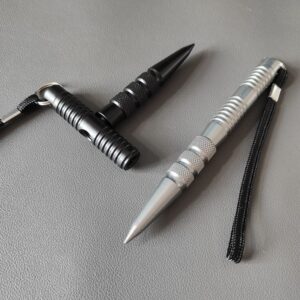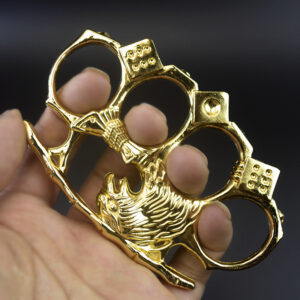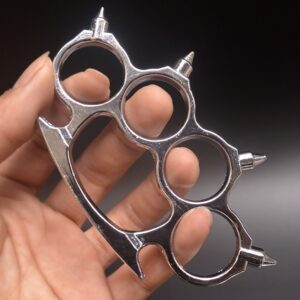No products in the cart.
Are Brass Knuckles Illegal in California?
Brass knuckles, often seen as symbols of toughness or self-defense, have a complex legal status in California. While some may view them as practical tools for personal protection, California law categorizes them as illegal weapons. Understanding the reasons behind this classification requires an exploration of the state’s legal framework, historical context, and implications for residents.
Legal Status of Brass Knuckles in California
Under California Penal Code § 21810, brass knuckles are classified as a prohibited weapon. This law makes it illegal to possess, manufacture, sell, or import brass knuckles in the state. Violation of this law can result in significant legal penalties, including felony charges, fines, and imprisonment.
The state’s stringent stance on brass knuckles stems from concerns about public safety. Brass knuckles are designed to enhance the impact of a punch, making them capable of inflicting serious injury. Their compact size allows them to be easily concealed, raising fears that they may be used in violent confrontations. This potential for misuse has led California lawmakers to take a hardline approach to their regulation.
Historical Context
The legal classification of brass knuckles in California has evolved over the years. Historically, brass knuckles were often associated with gang violence and street altercations. As crime rates rose in urban areas during the late 20th century, public perception of these weapons became increasingly negative. Policymakers responded by implementing stricter laws to curb the proliferation of items that could easily be used in violent crimes.
The late 1990s and early 2000s saw a wave of legislation aimed at reducing gang violence and enhancing public safety. Brass knuckles, alongside other weapons such as switchblades and batons, were included in this crackdown. California’s strict laws reflect a broader trend in the U.S. toward more rigorous weapon control, particularly concerning items that can cause significant harm with minimal effort.

Reasons Behind the Prohibition
Several key factors contribute to the prohibition of brass knuckles in California:
- Public Safety Concerns: The primary motivation behind the prohibition is the potential for serious injury. Brass knuckles can cause severe damage during altercations, and their design makes them effective for inflicting harm. This risk of injury poses a significant concern for lawmakers, who prioritize public safety.
- Association with Violent Crime: Brass knuckles have historically been linked to violent crime, particularly in urban areas. Law enforcement agencies have documented instances where brass knuckles were used in assaults, contributing to the perception that they are tools for criminal activity rather than self-defense.
- Ease of Concealment: The compact and easily concealable nature of brass knuckles makes them particularly problematic from a law enforcement perspective. Individuals can carry them without detection, which raises concerns about their use in impulsive or heated situations, potentially escalating conflicts.
- Lack of Regulation: Unlike firearms, which are subject to extensive regulations and licensing requirements, brass knuckles can be easily acquired and carried. This lack of oversight adds to the risks associated with their use, prompting lawmakers to take a preventive stance by outright banning them.
- Self-Defense Arguments: Proponents of self-defense rights often argue for the legalization of brass knuckles, claiming that they can serve as effective tools for personal protection. However, California lawmakers have generally prioritized public safety over individual self-defense claims, leading to the continued prohibition of these items.
Legal Penalties for Violating Brass Knuckle Laws
Violating California’s laws regarding brass knuckles can lead to severe consequences. Possessing brass knuckles is classified as a misdemeanor, which can result in penalties that include:
- Fines: Individuals convicted of possessing brass knuckles may face fines that can range up to $1,000, depending on the circumstances of the offense.
- Imprisonment: A misdemeanor conviction can also result in up to six months in county jail, although sentences can vary based on prior criminal history and the specific details of the case.
In some instances, individuals charged with possession of brass knuckles may face enhanced penalties if they have prior convictions or if the brass knuckles are used in a criminal act. In such cases, the charges could be elevated to a felony, resulting in more severe consequences.
Legal Alternatives and Self-Defense
While brass knuckles are illegal in California, residents still have access to various self-defense options. Pepper spray, stun guns, and personal alarms are legal alternatives that individuals can carry for protection. California law regulates these items, but they are generally permitted for personal defense, provided users follow the legal guidelines.
For individuals concerned about their safety, seeking self-defense training can also be beneficial. Learning techniques for de-escalating confrontations and defending oneself without resorting to weapons can provide a safer and more effective approach to personal security.
The Future of Brass Knuckle Legislation
As societal attitudes toward self-defense and weapon ownership continue to evolve, there may be ongoing debates regarding the legality of brass knuckles in California. Advocacy groups and self-defense proponents may push for reforms, arguing that individuals should have the right to choose how they protect themselves. However, given the state’s historical stance on weapons regulation, significant changes to brass knuckle laws seem unlikely in the near future.
Conclusion
In summary, brass knuckles are illegal in California under Penal Code § 21810, primarily due to public safety concerns and their association with violent crime. While proponents of self-defense argue for their legalization, the state maintains a stringent approach to weapons regulation, prioritizing the prevention of injury and crime. For California residents, understanding the implications of brass knuckle laws is crucial for ensuring compliance and exploring alternative self-defense options.










